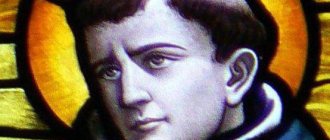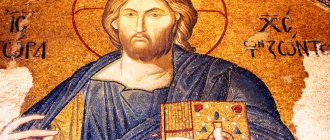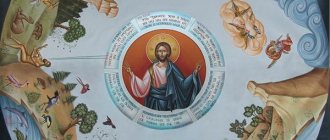Religion and science were not separated until the Middle Ages
Religion and natural science were not always opposed. In ancient and earlier times there was no division at all between the religious and scientific picture of the world. On the contrary, a holistic worldview without narrow areas prevailed.
There were no biologists or chemists; the learned man was a versatile person, knowledgeable in a little of everything.
A striking example is Archimedes (287 BC - 212 BC): mathematician, philosopher, inventor, etc. Then, of course, they talked about belief in God or gods. For example, the mathematician and astronomer Thales (624 BC - 546 BC) is credited with the opinion that living and inanimate nature has a moving principle - God or the soul.
The astronomer and philosopher Thales believed in one God and represented Him as the world soul
In the Middle Ages, the question of the existence of God was also rarely raised. Even though science began to be divided into narrow areas, faith was still the norm, and one could pay with one’s life for atheistic or heretical beliefs.
Copernicus, Bruno and Galileo are often mentioned to illustrate such theses, but this is not correct.
- Copernicus (1147 - 1543) lived quietly and peacefully, was a religious man, had no problems with the Church;
- Bruno (1548 - 1600) was indeed burned at the stake, but not for his scientific views, but for his passion for magic;
- Galileo (1564 - 1642) was a religious man, but his scientific discoveries contradicted established ideas about the structure of the Universe. The church forced the scientist to renounce his views.
In 1992, John Paul II repented of this mistake of Catholicism and rehabilitated the great astronomer.
Another of the greatest scientists, Miguel Servetus (1511 - 1553), also had disagreements with the Church. Even when threatened with death, he did not recognize Jesus Christ as the eternal Son of God. Miguel Servet denied the dogma of the Trinity and presented everything somewhat differently, for which he was burned at the stake.
1992
this year John Paul II rehabilitated Galileo
Only towards the end of the Middle Ages, adherence to the scientific picture of the world required opposition to religion. After all, the pressure of Church dogmas did not weaken.
Leonardo da Vinci believed only in his own experience, criticized dogmatism, but not God
One of the most famous scientists in human history is Leonardo da Vinci (1452 - 1519). Both atheists and believers love to refer to it. Supporters of conspiracy theories simply love to look for various signs and secret meanings, the secrets of Christianity in da Vinci’s works. But it is impossible to say unequivocally about a scientist’s attitude to faith.
Atheists like to refer to the following terms from the pen of Leonardo da Vinci:
“They will talk to people who hear nothing, whose eyes are open but do not see; they are ready to talk to them and not receive an answer; they are going to ask favor from the one who has ears and does not hear; they want to light candles for someone who is blind.”
“In all parts of Europe great nations will mourn the death of one man who died in the East.”
Leonardo da Vinci
scientist
This can be disconcerting, since da Vinci is known for his religious themes in his paintings. But even in them it is easy to detect a desire for realistic depiction and neglect of spiritual accents.
Da Vinci relied only on experience and criticized believers for dogmatism
And yet the situation is not so clear-cut. Leonardo da Vinci adhered to one very important view - he eschewed dogma. He believed in only one power - experience.
Everything outside of it is not serious and does not deserve attention. This approach allowed Leonardo da Vinci to become a great scientist.
Church dogma could not satisfy Leonardo da Vinci, since it presupposed blind faith. He criticized the dogmatic approach, the lack of living thought, and not the faith itself. And yet he tried not to talk about God. Art critic Dilshat Harman characterizes da Vinci’s attitude to spirituality as follows:
“For him, the knowledge of God does not become the head of the pyramid, does not become the cornerstone.
And this is such a new spirituality, it is a little open for further development. <…>
Because his spirituality is precisely vague, it is unclear, it is a little bit mysterious.”
Dilshat Harman
art critic
Why do believers have fear of God if, as they claim, God is Love?
The concept of fear of God is directly related to the concept of Love. The fear of God is the fear of offending God, of doing something against the love of God and neighbor. In the Christian tradition, it is generally accepted that the fear of God manifests itself in different ways in three conditional groups of believers who are at different levels of spiritual life. The first group is people with a “slave” consciousness. This is the lowest level of religious worldview, when the only motive for living according to the commandments for a person is the fear of punishment in the afterlife. The next level is the consciousness of a “mercenary”; a person does not break the commandments for fear of losing the reward for a virtuous life. And finally, the level to which we are all called is “filial” consciousness. Christians, who see God as a loving Father, are afraid to respond to this Love with cold indifference. All these three states of the soul are fear of God. But the first two are only intermediate steps, after passing which a Christian must finally realize that he is a son of God. And the son is afraid of only one thing - to fall away from the Father and from His Love through sins.
Read about love and fear here:
• Love and rage: can the All-Merciful God be angry? • Fear of God and love of God - what is it and why? • How is it that Heavenly Father terrifies some of us? God's children are on the verge of a nervous breakdown
Newton believed in God and wrote theological works
Isaac Newton (1642 - 1727), English physicist, astronomer, mechanic and philosopher, is one of those scientists who sincerely believes in God. He wrote a lot on the topic of spirituality.
“If there is no God and our whole life is a second on the way from dust to dust,
... more authentic than all secular history.”
Isaac Newton
scientist
Newton did not imagine that the world could appear in any other way than as the Holy Scriptures say:
“Such a most graceful conjunction of the Sun, planets and comets could not have happened except by the intention and power of a powerful and wise Being.”
But it would be a mistake to believe that Newton was simply a religious scientist who spoke warmly about religion but knew little about it. On the contrary, he delved deeply into religious issues and was not afraid to criticize theologians:
“The main mistake of the interpreters of the Apocalypse was that, on the basis of Revelation, they tried to predict times and events, as if God had made them Prophets.
Thanks to this, these interpreters themselves were condemned and at the same time aroused distrust in prophecy in general.
But Divine destiny was completely different.
God gave this Revelation, as well as the Prophecy of the Old Testament, not in order to satisfy the curiosity of people, making them able to foresee the future, but so that His holy Providence, and not the insight of interpreters, would actually be revealed to the world through its fulfillment.
For the occurrence of events predicted several centuries ago serves as convincing proof that the universe is governed by Providence...
In recent times, the huge revolution predicted in the Holy Scriptures will immediately turn people’s eyes both to the Prophecy and to a detailed interpretation of them.”
Isaac Newton
Scientist
If man is the image of God, does this mean that he can treat animals with disdain?
This means exactly the opposite. Man was created by God as the ruler of the created world, therefore he bears full responsibility for it. Elder Paisiy Svyatogorets directly said that for animals, man is God. Just as people ask for help from God, so animals ask for help from humans. Therefore, if we want to become like God, we should treat with love and compassion not only people, but also our smaller brothers. Neglect hardens the soul. Having started with it, a person, unbeknownst to himself, can reach the point of anger towards animals, and this is a real sin. The holy righteous John of Kronstadt wrote: “...Do not breathe malice, vengeance, murder even on animals, so that your own soul is not put to death by a spiritual enemy who breathes malice in you even against dumb creatures, and so that you do not get used to breathing malice and vengeance on people. . Remember that animals are also called to life by the goodness of the Lord so that they can taste as much as they can, in a short period of life, of the joys of existence. The Lord is good to everyone. Do not hit them if they, being unreasonable, do anything wrong or if any of your property suffers from them. Blessed is he who also has mercy on cattle.”
Continuing the topic, read:
• One priest said that a dog is an unclean animal and cannot be allowed into the temple, but a cat is allowed. Why is that? The priest answers a teenager's question • Does a dog have a soul? • Will animals go to the Kingdom of Heaven?
Albert Einstein believed in an impersonal God and did not profess any religion
Albert Einstein (1879 - 1955) - Nobel Prize laureate in physics, author of many scientific works, one of the most outstanding and famous scientists in the world. His name has become a household name. It is not surprising that this man’s opinion carries great weight for believers and atheists.
Everyone from time to time tries to pull Einstein into their camp, but his views are much more complex than simple pros and cons. This scientist never undertook to assert what science thinks about God. He spoke only for himself.
Einstein did not share any religion and called his faith pantheism
Einstein avoided unambiguous formulations, but sometimes allowed himself to talk about some narrow topic in a religious topic:
“I cannot take the idea of a personal God as an anthropological concept seriously.
I also feel that it is not possible to imagine a desire or a goal outside the human sphere.
My views are close to Spinoza: admiration for beauty and faith in the logical order of things, which we can humbly and only partially understand.
I believe that we must be content with our imperfect knowledge and understanding that personal values and moral obligations are the most important of human problems."
Such streamlined shapes provided the basis for attributing Buddhism to Einstein. Atheists considered the renunciation of the anthropomorphic God to be an indicator of Einstein’s lack of faith, but he remained himself: “he believed in something higher,” but never said what exactly. And yet God for him is not a person, but rather a force or law:
“I do not believe in a personal God and have never denied this, but I have expressed it clearly.
If there is something in me that can be called religious, then it is undoubtedly boundless admiration for the structure of the Universe to the extent that science reveals it.”
In his beliefs, Einstein is close to Eastern traditions, like most schools of Buddhism, where there is no God as a person, but there is some abstract energy, the absolute, the world:
This belief is associated with a deep belief in the Supreme Intelligence, which shows itself in the world of experience, represents my concept of God.
In common parlance this can be described as “pantheism” (Spinoza).
So, from Einstein’s point of view, everything in the world contains a single substance, a kind of spirit, but a spirit without personality.
Einstein's views are similar to the dogmas of Hinduism and Buddhism.
Such ideas exist in Hinduism, Buddhism, and some occult movements. But it would be wrong to put an equal sign between their ideas about God and what Einstein believed.
And although he did not consider himself a follower of any traditions, this did not stop the scientist from talking about morality, morality, kindness and responsibility of people:
“In vain, in the face of the catastrophes of the 20th century, many complain: “How did God allow it?”... Yes.
He allowed: He allowed our freedom, but did not leave us in the darkness of ignorance. Let the knowledge of good and evil be indicated.
And the man himself had to pay for choosing the wrong paths.”
Many physicists believed in God, but not all
Over the past centuries, many scientists have speculated about God. Here, for example, is what famous physicists say about this:
William Thomson. Believed that through science one gains faith in God
William Thomson, Lord Kelvin (1824 - 1907), British physicist and mechanic:
“Don't be afraid to be free-thinking people. If you think deeply, through science you will gain faith in God.”
Max Born.
Max Born (1882 - 1970), German physicist, one of the creators of quantum mechanics, said that science has no right to judge God
“Science has left the question of God completely open. Science has no right to judge this.”
“Many scientists believe in God. Those who say that studying science makes a person an atheist are probably some kind of funny people.”
Arthur Compton, stated “In the beginning is God”
Arthur Compton (1892 - 1962), American physicist, Nobel laureate:
“For me, Faith begins with the knowledge that the Supreme Mind created the Universe and man.
It is not difficult for me to believe this, because the fact of the existence of a plan and, therefore, Reason is irrefutable.
The order of the Universe, which unfolds before our eyes, itself testifies to the truth of the greatest and most sublime statement: “In the beginning is God.”
Wolfgang Pauli believed in God
Wolfgang Pauli (1900 - 1958), Swiss physicist, Nobel laureate.
“We must also admit that in all paths of knowledge and deliverance we are dependent on factors beyond our control and which in religious language bear the name of grace.”
Karl Werner Heisenberg.
Believed that knowledge of science is knowledge of God Karl Werner Heisenberg (1901 - 1976) German physicist, Nobel laureate
“The first sip from the vessel of natural science makes us atheists, but at the bottom of the vessel God awaits us.”
But not all scientists support each other on this issue.
Stephen Hawking was an atheist
One of the most famous scientists of our time, Stephen Hawking (1942 - 2018), adhered to atheistic views:
“I guess I believe in God, if by God you mean the embodiment of the forces that control the Universe.”
“If we discover a universal theory, it will be an absolute triumph of human thought, because then we will know what the mind of God is.”
“Having known the Divine mind, we know the same thing that God would know if He existed. But He doesn't exist. I am an atheist... Religion encourages belief in miracles, but they contradict science.”
But what can actually change the view of scientists for a believer? Absolutely nothing. A scientist is a person who is knowledgeable in his field of knowledge. This does not make him infallible and always right.
A scientist is only a person, he can also make mistakes.
Therefore, no matter how many scientists adhere to one point of view or another, it should not be significant for each of us. We make our own choices.
By leaving a comment, you accept the user agreement
Types of disbelief
Forced unbelief is when from birth a person was raised in unbelief, he did not know about the moral spiritual world. Such people who do not believe in God can quickly become believers; their faith lies dormant, but under certain circumstances it manifests itself.
Ideological unbelief is when a person defends his unbelief and turns away from God. Such people claim that the Almighty does not exist, it is only invented by people. Non-believing ideological people believe that if it cannot be materially felt, then He does not exist. Such people defend disbelief in God and protest against religion.








